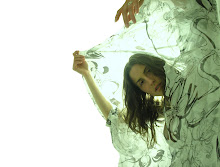
Monkey Beach was the first book my mother gave me in university. English is her second language, so these types of gifts have been few and far between. She liked the title, and wrote her hopes for my success in the future on the first page. As you can imagine, it is one of my most treasured gifts. However, despite the special circumstances of my discovering it, it has always been one of my favourite books.
Blood Sports is Eden Robinson's second novel. Considering my anticipation for more of her writing, I couldn't believe that I had missed its release in 2006. The excerpt below proves that it was worth the wait:
Hi Mel,
If you’re not eighteen yet, I want you to put this letter down right now. Okay? There’s a whole bunch of shit you don’t need to deal with until you’re ready. Your mom (I call her Paulie, even though she hates it. Try it, and you’ll get her Popeye squint) and I talked it over. We agreed not to put the heavy on you because we’re trying not to fuck your head up too bad.
You probably won’t be Melody when you read this. I’m wondering what Paulie will change your name to. Paulie was stuck on Anastasia, after the princess, but I thought no one would be able to spell it and you’d get tagged with Stacy or Staz or anything but your real name. My top choice was Sarah, but Paulie thought that was going to bite you in the ass in school when you met up with the hundred other Sarahs in your class. We went through a whole bunch of baby-name books, and couldn’t agree on a single name. Paulie’s picks were too fancy and she thought mine were dull. Her words in the operating room: “If you fucking stick my girl with Jennifer while I’m under, I will rip your nuts off.”
Paulie wanted an all-natural birth at home. Her friends here are into hippie shit like giving birth in wading pools and eating the placenta. Besides, she hates hospitals, doesn’t think they’re clean enough and hated the thought of you in a germ-factory. I’m not a big fan of hospitals myself, so we were all set to have you enter the world at home (no pool or placenta though). But things got hairy, and Ella, the midwife, called an ambulance. Paulie kept saying she’d spent enough of her life wasted and didn’t want any shit, but she ended up having every drug in the book. I’m sure when she’s mad she tells you what a pain you were to deliver.
Paulie exploded when they put the tent around her belly because she wanted to watch you coming, even if they were going to cut you out. Is your mom all ladylike now? Ha. I bet she is. You wouldn’t believe the things that came out of her mouth, but they put the tent up anyway and she asked me to videotape everything so she could watch it later. I saw the first incision and said, “Can’t do it, Paulie.”
The midwife wouldn’t videotape, but she said she’d describe everything to Paulie. Ella is this tiny fireball, a Filipina in her mid-forties, and she had to hop to peek over. I went and found her a stool and then waited in the hallway because there was no way I could listen to that. I walked down to the vending machine and got a coffee. So I missed your grand entrance. But we have a tape of everything up to that point, even the ambulance ride. I’m sure Paulie’s made you watch it by now. I stapled Ella’s business card to the back of this page, so you can look her up if you want.
I could hear you crying. You were loud as an opera singer. I could hear you all the way down the hall. Sad fact: Your dad is a big old weenie. I got a head rush and had to sit down. When I finally got my rear in gear, the nurse and midwife were checking you out, cleaning you up and swaddling you in the corner. The surgeon was finishing up your mom. She was pretty wiped. We’d been awake for three days by then.
When Paulie asked Ella if she should nurse, Ella laid you on her and you latched just like that. No problemo. All the shit going down and you took it in stride. Your mom’s smile, all proud of you.
“Come around here, you’ve got to see this,” Paulie said. “It’s like she’s mainlining.”
The nurse beside her stiffened. We’d had to disclose about Paulie being in Narcotics Anonymous. I think we freaked some of the staff. The whole week we were in the hospital, they acted like we were going to break out the rigs and turn our room into a shooting gallery.
I never got the deal with newborns. You were bald but hairy, red and wrinkled like any other newborn, and I’m sorry, Mel, but man, that is not a good look on you. You were sucking at Paulina’s boob like there was no tomorrow, your eyes screwed tight in ecstasy.















































